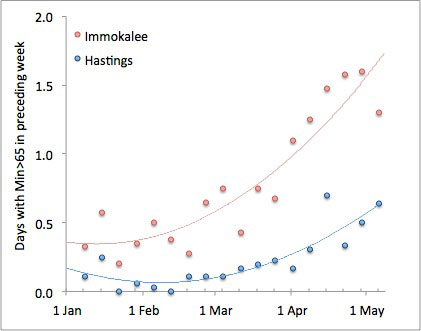Dear Florida Climate Center Friends,
We'd like to present you with the October 2013 edition of our newsletter. In this newsletter, you'll find our monthly climate summary, a list of special events that our staff attended, and a special statement of the recent release of the Intergovernmental Panel on Climate Change (IPCC) Report. If you have any questions, please email us at climate@coaps.fsu.edu.
Thanks,
The Staff of the Florida Climate Center
 |  |  | David Zierden
State Climatologist | James O'Brien
Professor Emeritus | Melissa Griffin
Asst. State Climatologist |
|
September Climate Summary for Florida
|
|
What Does the New IPCC Report Mean to Florida?
The United Nations sponsored Intergovernmental Panel on Climate Change (IPCC) issued the "Summary for Policy Makers" for its latest climate change assessment on Friday, September 27th. The IPCC was formed in 1988 and has compiled these assessments, or state of climate change science reports, every 5-6 years since then. The full report will be released in three parts and consist of thousands of pages of research and experiments compiled from hundreds of climate scientist from around the world.
The headline of this year's assessment from the summary for policy makers is that it is now extremely likely (95% confidence) that human activity and the release of greenhouse gases is responsible for more than half the observed warming in global temperatures. This is an even greater confidence than the last report in 2007, where it was deemed very likely, or 90% confidence. The summary for policy makers also contains statements on how increasing greenhouse gas concentrations may be affecting other aspects of climate like droughts, extreme events, hurricanes, sea level rise, and snow and ice cover. State Climatologist David Zierden reviews the findings of the IPCC summary for policy makers and compares that with observations and climate patterns in the State of Florida in this brief report:
http://climatecenter.fsu.edu/ipcc-statement
|
|
Florida Climate Center Kids Page
The Florida Climate Center is pleased to announce the launch of the Florida Climate Center Kids page:
http://climatecenter.fsu.edu/kids/
The page features information on different topics of Florida's climate, interactive tools, educational videos and games. The website will be continually updated with new content, tools and more. Feel free to look at the site and provide us with any insightful suggestions.
|
|
WIMSE Visit
On September 24th, Assistant State Climatologist Melissa Griffin joined Center for Ocean-Atmosphere Predictions Studies researchers Alexandra Bozec, Hannah Hiester, Lauren Zuromski, and Meredith Field in hosting 5 students from Florida State University's Women in Math, Science and Engineering (WIMSE) program. Ms. Griffin talked to the students about her experiences as research climatologist over the last decade and presented some of her research, linking how weather can impact a variety of other fields. In addition, Drs. Bozec and Hiester gave insight into oceanography and Ms. Zuromski spoke about her experiences as a student and working with data.
|
|
Upcoming Events
November 12-15, 2013:
Southeast Climate Consortium Fall Planning Meeting in Gainesville, FL
December 10, 2013:
Extension Winter Weather School in Tavares, FL
January 13-17, 2014:
4-H Youth Development Institute Conference in Ocala, FL
February 2-6, 2014:
94th Annual Meeting of the American Meteorological Society in Atlanta, GA
|
|
Example Data Request
Agriculture is an important part of the economy of Florida and the Florida Climate Center has answered numerous weather requests to help those with agricultural interests across the state. Recently, a professor from the Department of Horticulture at Cornell University contacted the Florida Climate Center for information pertaining to the number of days in a year that the minimum temperature was over 65˚F during the growing season (January 1 through April 30) in Immokalee and Hastings, FL. The purpose of the study was to investigate the risk of hot weather that makes it risky to harvest broccoli.

|
|
About Us
The Florida Climate Center is part of a three-tiered system of national, regional, and state climate offices, including NOAA's National Climatic Data Center and the Southeast Regional Climate Center. The Florida State Climatologist and other staff at the Florida Climate Center provide the following information and services to the people of Florida:
· Climate Data:
Historical weather observations for weather stations throughout the state of Florida. We are able to provide data for most stations from 1948-present.
· Climate Information:
Long-term historical averages for various stations, climate divisions, and the entire state.
· Extreme Event Records:
Information and analyses on extreme events such as freezes, droughts, floods and hurricanes.
· Special Analysis:
With their vast knowledge of El Niņo, La Niņa and climate variability, the State Climatologist and staff can offer expert insight into Florida's climate trends.
· Outreach:
Activities, presentations, and workshops that inform and educate the people of Florida about current and emerging climate issues. We also coordinate volunteers for the Community Collaborative Rain, Hail & Snow Network (CoCoRaHS).
More About Us
|
|